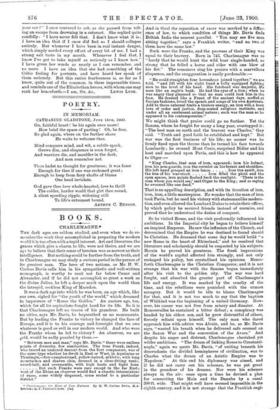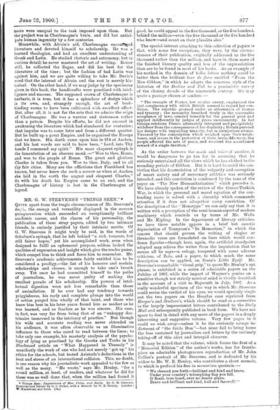BOOKS.
CHARLEMAGNE.* •
THE dark ages are seldom studied, and even when we do re-
member the work they accomplished in preparing the modern world it is too often with a tepid interest. Art and literature, the graces which give a charm to life, were not theirs, and we are apt to believe that their sense of heroism was as narrow as their intelligence. But nothing could be further from the truth, and in Charlemagne we may study a curious period in the person of its greatest man. The hero of two nations, as Mr. H. W. Carless Davis calls him in his sympathetic and well-written monograph, is worthy to rank not far below Caesar and Alexander, and if he did not accomplish so great a work as the divine Julius, he left a deeper mark upon the world than the intrepid, reckless King of Macedon.
It was a dark age into which he was born, an age which, like our own, sighed for "the youth of the world," which dreamed in impotence of "-Rome the Golden." An austere age, too, which for all its aspirations fought hard for its life. So it is that Charlemagne left no traces of his grandeur. He built no cities, says Mr. Davis, he bequeathed us no monuments. But by leading the Franks to victory he changed the face of Europe, and it is to his courage and foresight that we owe whatever is good or evil in our modern world. And who were the Franks whom he led to victory P An observer, we are told, would be sadly puzzled by them :—
" Between man and man," says Mr. Davis." there were endless points of diversity, few similarities. The true Frank, indeed, wbo traced an unmixed descent from the first conquerors, was of the same type whether he dwelt in East or West, in Aquitaine or Tharin gia,—fair-complexioned, yellow-haired, athletic, with long moustaches and shaven chin, dressed in a close-fitting tunic, sword-belt, and overmantle, with high boots and tight hose.
But such Franks were rare except in the far East; west of the Rhine an observer would find a chaotic intermixture of races, some widely dispersed, some rooted to a particular district."
° Charlemagne, the Hero of Two Nations. By H. W. Carless Davis, M.A. London G. P. Putnam's Sons. [.-.a.] And in Gaul the separation of races was marked by a differ. owe of law, to which condition of things Mr. Davis finds British India the nearest parallel. "You •may see five men sitting" together," says a Frankish writer, `tend no two of thein have the same law."
Such were the Franks, and the prowess of their King was equal to their bravery. Born in 743, Charlemagne was so " hardy that he would hunt the wild boar single handed, so strong that he felled a horse and rider with one blow of his fist." The romances sing his praises with a marvellous eloquence, and the exaggeration is easily pardonable :—
"He could straighten four horseshoes joined together," we are told, "and lift with his right hand a fully equipped fighting man to the level of his head. His forehead was majestic, Ms nose like an eagle's beak. He had the eyes of a lion; when he was angry they gleamed so that no man could look him in the face. He dressed like a Frank of the ancient days, scoffed at foreign fashions, loved the speech and songs of his own Austrasia. Add to these external traits a tireless energy, an iron will, a keen love of order and justice, deep-seated religious instincts, and under all an exuberant animal nature ; such was the man as he appeared to his contemporaries."
We might think that praise could go no further. Yet the Saxons, whom he fought for many a long year, overtopped it:
" The best man on earth and the bravest was Charles," they said. " Truth and good faith he established and kept." But
war was the first business of his life ; no sooner was he firmly fixed upon the throne than he turned his face towards Lombardy ; he crossed Mont Cenis, surprised Didier and his host and marched upon Pavia, and this is how he appeared to Otger
"King Charles, that man of iron, appeared; iron his helmet, iron his arm-guards, iron the corselet on his breast and shoulders.
His left hand grasped an iron lance Iron the spirit, iron the hue of his war-steed Iron filled the plain and the open spaces, iron points flashed back the sunlight. ' There is the man whom you would see,' said Otger to the King; and so saying he swooned like one dead."
That is an appalling description, and with its iteration of iron, iron, iron, a little masterpiece. No wonder that the man of iron took Pavia, but he used his victory with statesmanlike modera- tion, and even allowed the Lombard Dukes to retain their offices, by which policy he secured friends instead of enemies, and proved that• he understood the duties of conquest.
So he visited Rome, and the visit profoundly influenced his ambitions. In the Imperial city he began to believe himself an inspired Emperor. He saw the influence of the Church, and determined that the Empire he was destined to found should be Christian. He dreamed that some day he would build "a new Rome in the heart of Rhineland," and he resolved that literature and scholarship should be respected by his subjects.
Herein he proved his greatness. The fresh impressions of the world's capital affected him strongly, and not only reshaped his policy, but crystallised his opinions. Hence- forth Charlemagne is the Christian Conqueror, and it is not strange that his war with the Saxons began immediately after his visit to the golden city. The war was hard fought, and absorbed the greater part of Charlemagne's life and energy. It was marked by the cruelty of the time, and the rebellious were punished with the utmost savagery. But it would be idle to blame Charlemagne for" that, and it is not too much to say that the baptism of Witikind was the beginning of a united Germany. How- ever, his career was not free from misery and disaster. At Roncesvalles he sustained a bitter defeat; a conspiracy was headed by his eldest son, and he grew distrustful of others, fiercely reliant upon himself. The only man who dared approach him with advice was Alcuin, and he, as Mr. Davis says, "wasted his breath when he delivered safe counsel on the Saxon War and the conversion of the Avars." And despite his anger and distrust, Charlemagne cherished yet wilder ambitions. " The dream of linking Rome to Constanti- nople," again we quote Mr. Davis, "of uniting beneath his descendants the divided hemispheres of civilisation, was to Charles what the dream of an Asiatic Empire was to Napoleon." At this end his diplomacy was aimed, and if he did not carry out his schemes, he was yet great in the grandeur of his dreams. Nor were his schemes always in the air: once upon a time he devised a plan for connecting the Main and the Danube by a canal 300 ft. wide. That might well have seemed impossible in the eighth century, and it is not strange that the Frankish engi. neers were unequal to the task imposed upon them. But the project was in Charlemagne's brain, and did but antici- pate htman ingenuity by a few centuries.
Meanwhile, with Alcuin's aid, Charlemagne encouraged literature and devoted himself to scholarship. He was a learned theologian, and had an excellent understanding of Greek and Latin. He studied rhetoric and astronomy, but (a curious detail) he never mastered the art of writing. Better still, he collected the Sagas, and did his best for the literature of the time ; but the fashion of bad Latin was against him, and we are quite willing to take Mr. Davis's word that the interest of Alcuin and the rest is merely his- torical. On the other hand, if we may judge by the specimens given.in this book, the handicrafts were practised with intel. I:gence and success. The supposed crown of Charlemagne is barbaric, it is true, but it has a splendour of design which is its own, and, strangely enough, the art of book- binding seems to have been cultivated with excellent effect. But, after all, it is not for the arts that we admire the reign of Charlemagne. He was a warrior and statesman rather than a patron. Despite his efforts, he did not succeed in awakening the literature which had slumbered for centuries ; that impulse was to come later and from a different quarter. But he built up a great Empire, and he organised the Europe that we know. His death came upon him in 814 at Aachen, and. his last words are said to have been, " Lord, into Thy hands I commend my spirit." His most eloquent epitaph is the lamentation of an obscure monk :—" Woe to thee, Rome, and woe to the people of Rome. The great and glorious Charles is taken from you. Woe to thee, Italy, and to all thy fair cities. Many are the afflictions that Frankland has known, but never knew she such a sorrow as when at Aachen she laid in the earth the august and eloquent Charles." So with his death his Empire came to an end, and the Charlemagne of history is lost in the Charlemagne of legend.



































 Previous page
Previous page